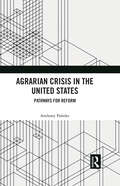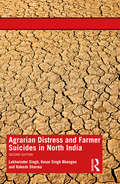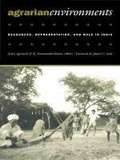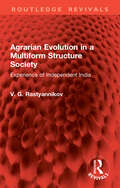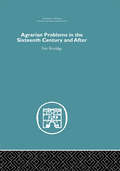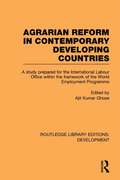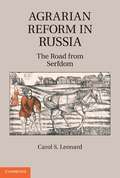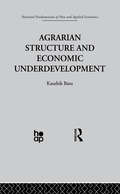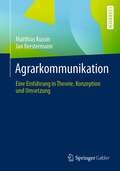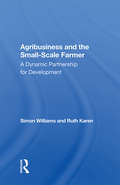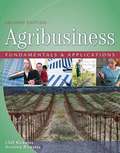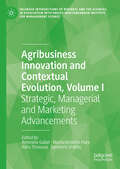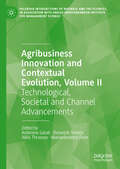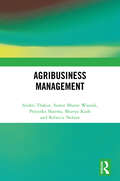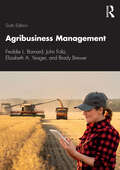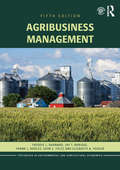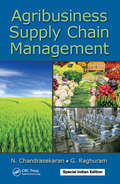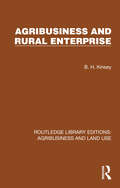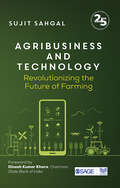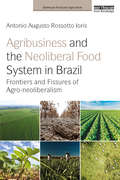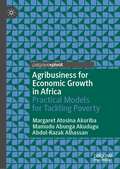- Table View
- List View
Agrarian Crisis in the United States: Pathways for Reform
by Anthony PahnkeFrom fragile, corporate-controlled supply chains breaking down, to millions of already hyper-exploited farmworkers risking their lives in the fields without basic personal protective equipment, the COVID-19 pandemic made it painfully obvious that US agriculture does not work. Agrarian Crisis in the United States: Pathways for Reform situates the many food system problems that the COVID-19 pandemic laid bare in historical context across four key policy areas, namely, in land, labor, markets, and the environment. In applying and building from the work of Jürgen Habermas, Agrarian Crisis in the United States highlights how deep-seated problems concerning systemic racism, economic inequality, and political legitimacy endanger the US food and farm system’s future. Besides analyzing crises, it presents solutions that would make agriculture in the United States more just and resilient through the implementation of certain communication and policy strategies. Its original argument, as well as a novel set of remedies, will appeal to scholars and activists with interests in agrarian studies, environmental policy, and social movements.
Agrarian Distress and Farmer Suicides in North India
by Rakesh Sharma Lakhwinder Singh Kesar Singh BhangooAgrarian distress in the era of globalization has manifested in the suicides of farmers and agricultural labourers. This book, using empirical research and field data from north India, especially Punjab, examines the different facets of this tragic phenomenon in rural India. Situating Indian agriculture in the context of globalization it looks at the underlying causes of farmer suicides in a state that was the model of modern capitalist agriculture and development. It also attempts to understand why other farmers have chosen not to take the same path. With a comparative framework and coverage of nearly 1400 rural households, it brings out the brutal manifestation of this complex and multidimensional situation in the Indian countryside. Topical, comprehensive and rich in data, this book will be valuable to scholars and researchers of political economy, agricultural economics, South Asian politics, political sociology, and public policy.
Agrarian Distress and Farmer Suicides in North India (Second Edition)
by Rakesh Sharma Lakhwinder Singh Kesar Singh BhangooThis volume provides a comprehensive and detailed socio-economic overview of agrarian distress in India which has manifested in the suicides of farmers and agricultural labourers. Using empirical research and field data from rural India, especially Punjab, this book examines the underlying causes of farmer suicide and steps which can mitigate the crisis. Covering nearly 1400 rural households, the research in this volume identifies the various dimensions of the deepening crisis in agriculture and farming. It categorises the factors of the problem across different regions and estimates its extent and magnitude. The authors, in this updated edition, focus on instances of political mobilization and collective movements by farmers struggling to bring the issue of agrarian distress to attention. The book also discusses the implementation of state-waivered loans and compensations and their effect on the farming community. Topical, comprehensive and rich in data, this book will be valuable to scholars and researchers of political economy, agricultural economics, South Asian politics, political sociology, and public policy.
Agrarian Environments: Resources, Representations, and Rule in India
by David Gilmartin K. Sivaramakrishnan Margaret Mckean Arun Agrawal Peter VandergeestAgrarian Environments questions the dichotomies that have structured earlier analyses of environmental processes in India and offers a new way of looking at the relationship between agrarian transformation and environmental change. The contributors claim that attempts to explain environmental conflicts in terms of the local versus the global, indigenous versus outsiders, women versus men, or the community versus the market or state obscure vital dynamics of mobilization and organization that critically influence thought and policy. Editors Arun Agrawal and K. Sivaramakrishnan claim that rural social change in India cannot be understood without exploring how environmental changes articulate major aspects of agrarian transformations--technological, cultural, and political--in the last two centuries. In order to examine these issues, they have reached beyond the confines of single disciplinary allegiances or methodological loyalties to bring together anthropologists, historians, political scientists, geographers, and environmental scientists who are significantly informed by interdisciplinary research. Drawing on extensive field and archival research, the contributors demonstrate the powerful political implications of blurring the boundaries between dichotomous cultural representations, combine conceptual analyses with specific case studies, and look at why competing powers chose to emphasize particular representations of land use or social relations. By providing a more textured analysis of how categories emerge and change, this work offers the possibility of creating crucial alliances across populations that have historically been assumed to lack mutual goals. Agrarian Environments will be valuable to those in political science, Asian studies, and environmental studies.Contributors. Arun Agrawal, Mark Baker, Molly Chattopadhyaya, Vinay Gidwani, Sumit Guha, Shubhra Gururani, Cecile Jackson, David Ludden, Haripriya Rangan, Paul Robbins, Vasant Saberwal, James C. Scott, K. Sivaramakrishnan, Ajay Skaria, Jennifer Springer, Darren Zook
Agrarian Evolution in a Multiform Structure Society: Experience of Independent India (Routledge Revivals)
by V. G. RastyannikovIndia in the 1950s and 1960s, with its diversity of economic structures and different levels of regional development, offers a unique opportunity to explore a wide range of agrarian evolution within a multiform society. Basing his study on an extensive survey of the existing literature as well as on fieldwork conducted in India, the author analyses in his book Agrarian Evolution in a Multiform Structure Society (first published in English in 1981) the roots of the Indian society and suggests future directions. He argues that India, like many Asian countries, exhibits tendencies peculiar to an economy evolving on the basis of dependent capitalist development.The author goes on to show how the state, in seeking to ease the teething problems of development, has assumed a decisive role, expressed in terms of the nationalisation of certain sectors of private exploitative property, and in the supersession of private interests by public ones. The historically inevitable progress of Indian society is therefore a paradoxical one: because its economy exists on the periphery of its system-moulding structure—world capitalism—it has special problems reconciled only by state intervention, this in turn makes the development of a capitalist society impossible. The result is a unique study of a society which has assumed increasing importance in world affairs.
Agrarian Problems in the Sixteenth Century and After
by Eric KerridgePresenting a full and precise description of all legal ties between landlord and tenant in early modern England, Agrarian Problems in the Sixteenth Century and After re-examines one of the key issues in English agrarian history - the question of the legal security of the copyholder. Comparing historical records and literary evidence, Agrarian Problems in the Sixteenth Century and After reprints much of the important 1969 edition of the book, and asserts that: * customary tenants enjoyed legal security in and before the sixteenth century * enclosures proceeded legally, without oppression, and in much the same form (whether ratified in parliament or not) throughout the whole period * depopulation was less extensive than sometimes supposed and that such depopulation as there was often proved economically profitable and not without social benefit. When first published in 1969, this fascinating book represented a unique viewpoint that affected, and in some cases reversed, much accepted opinion. As a landmark work in a highly important area of English agrarian history, it still has considerable impact today.
Agrarian Reform in Contemporary Developing Countries: A Study Prepared for the International Labour Office within the Framework of the World Employment Programme (Routledge Library Editions: Development)
by Ajit Kumar GhoseInitially published in 1983, in association with the International Labour Organisation (ILO), this book is about the meaning, relevance and process of agrarian reform in contemporary developing countries. It includes seven detailed case studies – one each on Ethiopia, Peru, Chile, Nicaragua, Iran, Kerala, (India) and West Bengal (India). In all the cases, serious contemporary efforts were made to implement agrarian reform programmes and the case studies focus upon selected aspects of this reform process – origins, basic characteristics, problems of implementation and immediate consequences. Each region differs considerably in terms of socio-economic and administrative conditions, but when the reform efforts are placed in their respective historical contexts, several common themes emerge which are dealt with in detail. In all cases, it is clear that agrarian reform is essentially a political process, requiring major social movements and that piecemeal reforms will not solve the grave problems of growth, distribution and poverty in the Third World.
Agrarian Reform in Russia
by Carol S. LeonardThis book examines the history of reforms and major state interventions affecting Russian agriculture: the abolition of serfdom in 1861, the Stolypin reforms, the NEP, the Collectivization, Khrushchev reforms, and finally farm enterprise privatization in the early 1990s. It shows a pattern emerging from a political imperative in imperial, Soviet, and post-Soviet regimes, and it describes how these reforms were justified in the name of the national interest during severe crises – rapid inflation, military defeat, mass strikes, rural unrest, and/or political turmoil. It looks at the consequences of adversity in the economic environment for rural behavior after reform and at long-run trends. It has chapters on property rights, rural organization, and technological change. It provides a new database for measuring agricultural productivity from 1861 to 1913 and updates these estimates to the present. This book is a study of the policies aimed at reorganizing rural production and their effectiveness in transforming institutions.
Agrarian Revolt in a Mexican Village
by Paul FriedrichAgrarian Revolt in a Mexican Village deals with a Taráscan Indian village in southwestern Mexico which, between 1920 and 1926, played a precedent-setting role in agrarian reform. As he describes forty years in the history of this small pueblo, Paul Friedrich raises general questions about local politics and agrarian reform that are basic to our understanding of radical change in peasant societies around the world. Of particular interest is his detailed study of the colorful, violent, and psychologically complex leader, Primo Tapia, whose biography bears on the theoretical issues of the "political middleman" and the relation between individual motivation and socioeconomic change. Friedrich's evidence includes massive interviewing, personal letters, observations as an anthropological participant (e. g. , in fiesta ritual), analysis of the politics and other village culture during 1955-56, comparison with other Taráscan villages, historical and prehistoric background materials, and research in legal and government agrarian archives.
Agrarian Structure and Economic Underdevelopment
by K. BasuKaushik Basu (Cornell University) explores the relation between agrarian institutions and economic development.
Agrarkommunikation: Eine Einführung in Theorie, Konzeption und Umsetzung
by Matthias Kussin Jan BerstermannTierwohl, Grüne Gentechnik, Hofsterben, biologische Vielfalt: Das Agri- und Foodbusiness steht im hohen Maße im Fokus der Öffentlichkeit. In diesem Buch werden Handlungsmöglichkeiten mit Blick auf die kommunikativen Aufgaben der Branche dargestellt – und dies erstmals auf Basis einschlägiger Ansätze aus den Kommunikationswissenschaften und dem PR-Management. Die Autoren liefern einen Überblick über branchenrelevante Themen wie Nachhaltigkeitskommunikation, Storytelling und Krisenkommunikation sowie ihre Einsatz- und Wirkungsweise im Rahmen einer professionellen Öffentlichkeitsarbeit.
Agrarpreisbildung: Theorie und Anwendung
by Ulrich Koester Stephan von Cramon-TaubadelIn diesem Lehrbuch werden wichtige Bestimmungsfaktoren der Preisbildung auf Märkten sowohl für Agrarprodukte als auch für die landwirtschaftlichen Produktionsfaktoren Boden, Arbeit und Kapital behandelt. Mit Hilfe der speziellen Annahmen der Neoklassik wird gezeigt, wie Agrarpreise entstehen könnten. Dieses Lehrbuch soll dazu beitragen, wie in einer realitätsnahen Analyse von Preisen und deren Änderungen auch die jeweilige Ausprägung von Institutionen und Organisationen einzubeziehen ist. Zahlreiche Beispiele und Übungsaufgaben bieten den Studierenden eine effektive Lernkontrolle.
Agribusiness And The Small-scale Farmer: A Dynamic Partnership For Development
by Simon Williams Ruth KarenBased on case histories from nine Third World countries, this study examines the successful cooperation between private agribusiness firms and small farmers to increase agricultural production and income in developing countries. In such ventures, small farmers are organized around a core private company that buys their output and provides manageria
Agribusiness Fundamentals and Applications
by Cliff Ricketts Kristina RickettsNIMAC-sourced textbook
Agribusiness Innovation and Contextual Evolution, Volume I: Strategic, Managerial and Marketing Advancements (Palgrave Intersections of Business and the Sciences, in association with Gnosis Mediterranean Institute for Management Science)
by Demetris Vrontis Alkis Thrassou Antonino Galati Mariantonietta FioreAgriculture is the oldest and most traditional of economic sectors, and its business has seen major evolutionary leaps over the past century. Contemporary agribusiness is being influenced and reshaped by technological advancements, geopolitical developments, globalisation, transport and logistics innovations, as well as changes in industry structure and consumer behaviour. Reflecting on these changes and providing a deep dive into this sector, this two-volume scientific works’ collection defines, refines, analyses, and prescribes the evolution of agribusiness in the present and future. Taken together, the books offer a comprehensive conceptualisation of the multifactorial macro, micro and organisational elements of agribusiness, including strategic, managerial, marketing, technological and geo-socio-political forces. Volume I explores the strategic, managerial and marketing aspects of contemporary agribusiness, and descriptively and prescriptively investigates the organisational and immediate industry practices and sectoral forces. Topics covered include circular business models, CSR communication practices, digital marketing, organisational sustainability and contemporary farming systems, to name a few..
Agribusiness Innovation and Contextual Evolution, Volume II: Technological, Societal and Channel Advancements (Palgrave Intersections of Business and the Sciences, in association with Gnosis Mediterranean Institute for Management Science)
by Demetris Vrontis Alkis Thrassou Antonino Galati Mariantonietta FioreAgriculture is the oldest and most traditional of economic sectors, and its business has seen major leaps in innovation over the past century. Contemporary agribusiness is being influenced and reshaped by technological developments, geopolitical developments, and globalisation, as well as transport and logistics innovations, changes in consumer behaviour.Reflecting on these changes and providing a deep dive into this sector, this two-volume work defines, refines, analyses, and prescribes the evolution of agribusiness in the present and future. Taken together, the books offer a comprehensive conceptualisation of the multifactorial macro, micro and organisational elements of agribusiness, including strategic, managerial, marketing, technological and geo-socio-political forces.Volume II focuses on the wider, macro-environmental forces acting upon agribusinesses, exploring the contextual evolutions that impact the sector, and the means, practices and avenues for its development.It includes topics such as digital technologies adoption, supply chain sustainability, big data analytics, women’s agricultural entrepreneurship, and simulation model decision making.
Agribusiness Management
by Priyanka Sharma Srishti Thakur Sumit Bharat Wasnik Bhavya Kush Rebecca NelsonThis book serves as a guide to understanding the intricacies and challenges of managing agribusiness enterprises in the modern era. It covers the fundamentals of agribusiness management and discusses the trends and emerging issues. Through real-world case studies and practical examples, this book aims to bridge the gap between theory and practice, enabling the reader to apply their knowledge in diverse agribusiness contexts.Print edition not for sale in South Asia (India, Sri Lanka, Nepal, Bangladesh, Pakistan and Bhutan)
Agribusiness Management
by Elizabeth A. Yeager Freddie L. Barnard John Foltz Brady BrewerThis sixth edition of Agribusiness Management provides students and managers with a fundamental understanding of the key concepts needed to successfully manage agribusinesses in a rapidly changing, high-tech, consumer-oriented, and uncertain world. The text uses four specific approaches to help readers develop and enhance their capabilities as agribusiness managers. First, it offers a contemporary focus that reflects the issues that agribusiness managers face today and are likely to face tomorrow. Second, the book presents conceptual material in a pragmatic way with illustrations and examples that will help the reader understand how a specific concept works in practice. Third, the book has a decision-making emphasis, providing contemporary tools that readers will find useful when making decisions in the contemporary business environment. Finally, Agribusiness Management offers a pertinent set of discussion questions and case studies that will allow the reader to apply the material covered in real-world situations. This edition has been updated throughout with new examples and data, as well as additional material on succession planning and managing human resources. This book is an ideal text for all courses on management in the agribusiness industry. The work is fully supported by a Companion Website which provides users with additional materials such as multiple choice questions, discussion questions, and PowerPoint slides for each chapter.
Agribusiness Management (Routledge Textbooks in Environmental and Agricultural Economics #4)
by Elizabeth A. Yeager Jay T. Akridge Freddie L. Barnard Frank J. Dooley John C. FoltzToday's food and agribusiness managers operate in a rapidly changing, highly volatile, international, high technology, consumer-focused world. Agribusiness Management helps prepare students and managers for a successful career in this new world of food and fiber production and marketing. This text uses four specific approaches to help readers develop and enhance their capabilities as agribusiness managers. First, it offers a contemporary focus that reflects the issues that agribusiness managers face today and are likely to face tomorrow. Second, the book presents conceptual material in a pragmatic way with illustrations and examples that will help the reader understand how a specific concept works in practice. Third, the book has a decision-making emphasis, providing contemporary tools that readers will find useful when making decisions in the contemporary business environment. Finally, Agribusiness Management offers a pertinent set of discussion questions and case studies that will allow the reader to apply the material covered in real-world situations. This fifth edition of Agribusiness Management has been updated throughout and continues to provide students and adult learners with an essential understanding of what it takes to be a successful agribusiness manager in today's rapidly evolving, highly unpredictable marketplace.
Agribusiness Management and Entrepreneurship (Third Edition)
by Michael E. Newman Walter J. WillsAgribusiness Management and Entrepreneurship is intended to fill the need for a basic textbook covering the planning, organizing, and managing of an operation; as well as provide a comprehensive source for those who wish to consider a business from the ownership point of view, specifically as it relates to the vast area of agribusiness.
Agribusiness Supply Chain Management
by N. Chandrasekaran G. RaghuramThe agribusiness supply chain includes a number of processes such as supply management, production management, and demand management to customers through a competitive distribution channel. Each step of the way can be plagued with issues such as diversity of production and demand, bulkiness of produce, perishability, and seasonality. Highlighting t
Agribusiness and Rural Enterprise (Routledge Library Editions: Agribusiness and Land Use #25)
by B. H. KinseyOriginally published in 1987 and now reissued with a new Preface by the author, this book is written primarily for planners, public administrators and project managers in countries or international agencies considering a development strategy in which agribusiness and rural enterprise projects are viewed as a desirable policy instrument for generating employment and income. It makes available the background and methodology of project analysis so that agribusiness and rural enterprise project can be designed, implemented and reviewed effectively in a wide range of circumstances. It outlines how to establish objectively the potential and limitations of agribusiness and rural enterprise projects; provides guidelines for deciding whether a project can be effective; considers the policy issues relating to such projects and suggests techniques for judging project performance.
Agribusiness and Technology: Revolutionizing the Future of Farming
by Sujit SahgalThe future of farming is here. Countries all over the world are racing to revolutionize farming. Indian agricultural sector, however, is facing several challenges and needs a makeover. India should adopt agritech to make farming lucrative on a sustained basis and liberate its farmers. Based on the author’s grassroot level discussions with thousands of farmers, entrepreneurs and policymakers, and a deep study of global trends, Agribusiness and Technology deliberates on the future of farming in India. It takes into consideration the farmers’ views and pain points, and pitches modern methods, best practices, effective business models and the use of technology as the best solution to make farming more lucrative, even for the small farmer. It provides a pathway for an early and impactful adoption of the various solutions. The book will speak to all—social entrepreneurs, venture capital investors, farmers, policymakers and students invested in the Indian agricultural sector and agribusiness.
Agribusiness and the Neoliberal Food System in Brazil: Frontiers and Fissures of Agro-neoliberalism (Earthscan Food and Agriculture)
by Antonio Augusto IorisDue to new production areas and persistent productivity gains, Brazil has consolidated its position as a global leader and even as a ‘model’ of commercial, integrated crop production. The country is now seen as an agricultural powerhouse that has a lot to offer in terms of reducing the prospect of a looming, increasingly global, food crisis. Agribusiness and the Neoliberal Food System in Brazil focuses on the intensification of Brazilian agribusiness as a privileged entry point into the politicised geography of globalised agri-food. Drawing on rich empirical analysis based around three fieldwork campaigns in the state of Mato Grosso, the book examines the connections between farming, markets and the apparatus of the state. The importance of agribusiness expansion within the wider politico-economic context of Brazilian neoliberalism is demonstrated, thus drawing broader conclusions about the main trends of agribusiness in the world today and providing recommendations for future research. This book will be of great interest to students and scholars of agribusiness, neoliberalism and global food production, as well as those interested in Brazil and Latin America more generally.
Agribusiness for Economic Growth in Africa: Practical Models for Tackling Poverty (Palgrave Advances in Bioeconomy: Economics and Policies)
by Abdul-Razak Alhassan Mamudu Abunga Akudugu Margaret Atosina AkuribaThis book provides exclusive information on how agribusinesses could act as the springboard for inclusive economic growth critical for socioeconomic transformation of Africa. It is a must read for academics, practitioners, policymakers, students, and all those interested in the application of practical models capable of tackling the endemic poverty situation in Africa using agribusiness as the launchpad. The book emphasizes the urgent need for robust and inward-looking enabling policy frameworks to help remove existing constraints on agro-industrialization and encourage investments. Thus, the book sets the agenda for the right combination of agricultural, industrial, and trade policies critical in promoting sustainable agricultural commodity value chains and food systems for inclusive growth and poverty reduction. Written in a simple, plain, and accessible language devoid of technical jargons, the book makes an interesting read for even the non-expert and is a valuable reference material for academic and practical training of students and practitioners.
